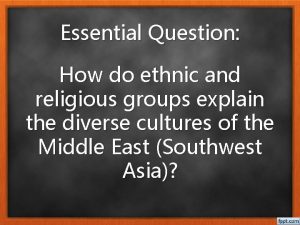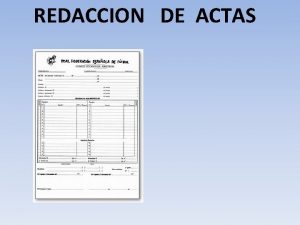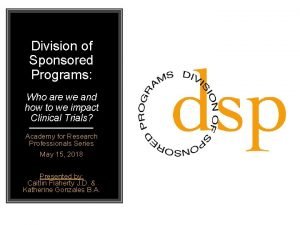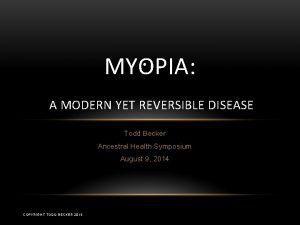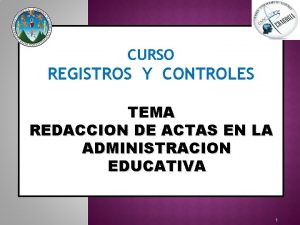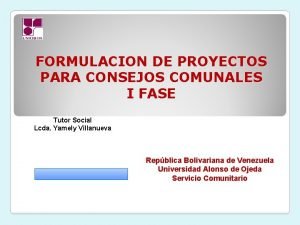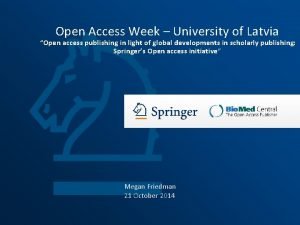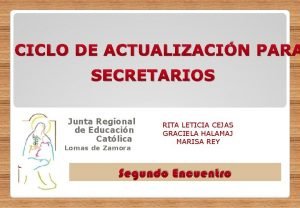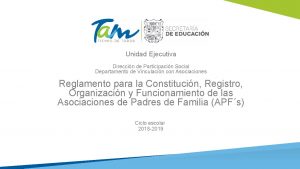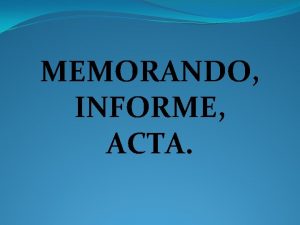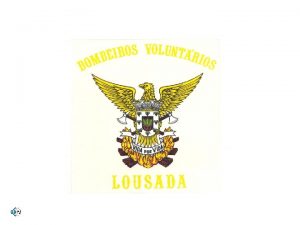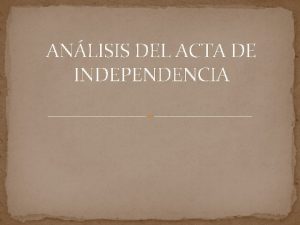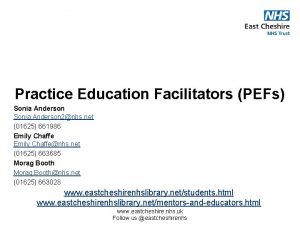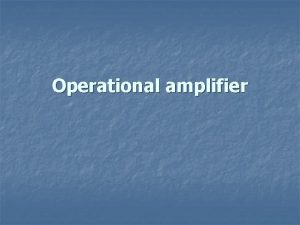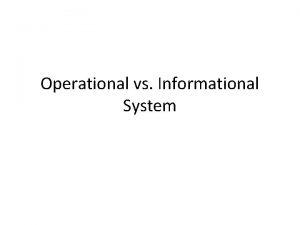TOWARDS OPERATIONAL GROUPS IN FRANCE Sonia Ramonteu ACTA










- Slides: 10

TOWARDS OPERATIONAL GROUPS IN FRANCE Sonia Ramonteu – ACTA With input from APCA, RAD-Civam, Trame

Content • 3 examples from recent history that could have been an operational group • 3 examples (real or imagined) that would not qualify as an operational group • What are bottlenecks in your country for farmers to discuss and be active in innovation? • How can EIP / Operational Groups address these bottlenecks? • How can Operational Groups be set up and farmers be motivated ? • What are bottlenecks in linking farmers with other stakeholders (business, ngo’s, research) ?

“existing” OG: case 1 : Valbiom • What challenge / opportunity does “OG” discuss? Development of a local productive system related to non-food valorisation of agro-resources, with eco-conception, based on local synergies between agricultural and industrial enterprises • How did the “OG” start, who initiated? Conference on bio-products agric. and trade&industry chambers launch a mission on bioproducts cluster : industry & agricultural enterprises, chambers, cooperatives, agricultural associations, research laboratories Obj. : promote local collaborations, identify and support projects (some with products on market), structure chain • What have been the key success factors for the “OG”? All farmers involved were all very interested in a new outlet (market) Co-construction with farmers groups Setting up of local synergies between farmers and industries • How have (national) policies contributed to the “OG”? Local authorities and national organism of territory development have funded the project

“existing” OG: case 2 : Système Terre et Eau • What challenge / opportunity does “OG” discuss? Animal production systems eco-efficient, thrifty, self-sufficient Grazing systems with objective to improve environmental impact, sustainability/viability of farm • How did the “OG” start, who initiated? Collaboration of Cedapa, study center on grazing systems, with INRA and regional authorities : characterisation and evaluation of sustainability of such systems Requirements/specifications written by farmers : “fodder systems input-saving” contract Recognition of these specifications as a national and european agri-environmental measure • What have been the key success factors for the “OG”? Strong direct involvement of farmers in a research-action process : methodology, collecting datas, steering the group and the project. Basic allowance for farmers = recognition of work of “farmer-researcher” • How have (national) policies contributed to the “OG”? Financial and technical involvement of regional authorities National and european recognition

“existing” OG: case 3 : RMT, Joint Technological Network, ex. Florad • What challenge / opportunity does “OG” discuss? Weed knowledge - management and control, and weeding (organic and conventional) Context : less herbicides authorised • How did the “OG” start, who initiated? Informal expert group of researchers (ITA-INRA), opened to agricultural chambers and high-schools, labelled at national level as JTN Obj. : promote and lead research projects on priority questions, provide operational knowledge and results, establish an expert group • What have been the key success factors for the “OG”? Federative collaborative projects successful in national competitive calls reinforced links between actors (so expertise recognised and mobilised) • How have (national) policies contributed to the “OG”? Slight coordination fund of the agriculture Ministry

Cases that would not qualify as OG Give a real or imagined example of a group that includes farmers, that according to your ideas would not be allowed to qualify as OG (or where you have doubts). • Local development projects with farmers and others actors of the territory : Lack of research perspective • Producers group under contract, linked to a firm or a retailer (dominated by private), with objective to maximize the margin • Trade union group of producers without research or innovation dimension

Bottlenecks for farmers to discuss and be active in innovation • Farmer capacity to innovate and adapt practices not recognized • Farmers were seen as final consumers of innovation in the framework of a very top-down transfer : research – development – farmers, like executors, underling, applicators of an innovation conceived by others, farmers had less initiatives and experimentation on their own system

How can EIP / Operational Groups address these bottlenecks? • Let farmers participate to governance of operational groups and be active/involve them in the setting up of projects • To compensate the time devoted by farmers to innovate in their practices, for experimentation in-situ

How can Operational Groups be set up and farmers be motivated ? • Farmers are motivated if their field needs and concerns and local initiatives are taken into account : involve them from the posing of an idea, the more upstream possible • To recognize the role of farmers as others actors : investment in time, money, land responsibilities or risks taken • Recognize farmers time to experiment and collect datas by compensations

Bottlenecks in linking farmers with other stakeholders? • Acquaintanceship is not optimal between actors, and actions are often fragmented • Divergent interests at short term, too much different problematics between researchers and farmers • GO role is indeed to promote dialogue, listening, mutual understanding
 Ejemplos de actas circunstanciadas
Ejemplos de actas circunstanciadas How are ethnic groups and religious groups related
How are ethnic groups and religious groups related Redaccion de acta
Redaccion de acta Ui division of sponsored programs
Ui division of sponsored programs Zenni optical lens types
Zenni optical lens types El acta caracteristicas
El acta caracteristicas Ejemplos de resultados de un proyecto
Ejemplos de resultados de un proyecto Acta veterinaria scandinavica impact factor
Acta veterinaria scandinavica impact factor Abc anexos salidas educativas
Abc anexos salidas educativas Redactar en forma impersonal
Redactar en forma impersonal Padres unidadejecutiva.ml
Padres unidadejecutiva.ml

